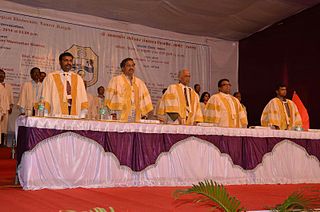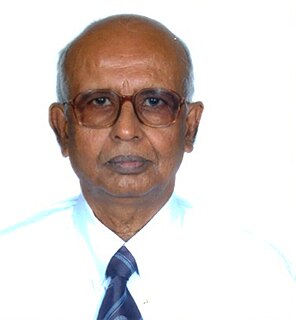
Man Mohan Sharma FREng is an Indian chemical engineer. He was educated at Jodhpur, Mumbai, and Cambridge. At age 27, he was appointed Professor of Chemical Engineering in the Institute of Chemical Technology, Mumbai. He later went on to become the Director of UDCT, the first chemical engineering professor to do so from UDCT.

Patcha Ramachandra Rao was a metallurgist and administrator. He has the unique distinction of being the only Vice-Chancellor (2002–05) of the Banaras Hindu University (BHU) who was also a student (1963–68) and faculty (1964–92) at that institution. From 1992 to 2002, Rao was the Director of the National Metallurgical Laboratory, Jamshedpur. After his tenure as Vice-Chancellor of B.H.U., in 2005, he took the reins of the Defence Institute of Advanced Technology (DIAT) as its first Vice-Chancellor. He was to serve DIAT until his superannuation in 2007. From 2007 till the end, Rao was a Raja Ramanna Fellow at the International Advanced Research Centre for Powder Metallurgy and New Materials, in Hyderabad, Andhra Pradesh.
Madhu Sudan Kanungo was an Indian scientist in the field of gerontology and neuroscience as well as a teacher of molecular biology and biochemistry. He is known for his theories on how gene expression changes with age and the role of this phenomenon in ageing, which is a widely accepted as "Gene expression theory of Aging". In recognition of his contributions, he was awarded India's fourth highest civilian award, Padma Shri in 2005. He held the post of BHU Emeritus professor in zoology at the Banaras Hindu University and was also the Chancellor, Nagaland University till his death.
Ayyappanpillai Ajayagosh is an organic chemist, academic and the director of the National Institute for Interdisciplinary Science and Technology. He is known for his studies on supramolecular assemblies and light induced sensor systems and is an elected fellow of all the three major Indian science academies viz. the National Academy of Sciences, India, Indian National Science Academy and the Indian Academy of Sciences as well as The World Academy of Sciences. The Council of Scientific and Industrial Research, the apex agency of the Government of India for scientific research, awarded him the Shanti Swarup Bhatnagar Prize for Science and Technology, one of the highest Indian science awards for his contributions to Chemical Sciences in 2007. He received the TWAS Prize of The World Academy of Sciences in 2013.
Valipe Ramgopal Rao is the Director of the Indian Institute of Technology, Delhi. He was a P.K.Kelkar Chair Professor in Department of Electrical Engineering, Indian Institute of Technology Bombay and is now also the Director at IIT Delhi. Ramgopal Rao has more than 475 publications in various journals, and 49 patents in the areas of Electron devices and Nanoelectronics. Ramgopal Rao was the first elected chairman for the Indian Section of the American Nano Society. He is also the recipient of multiple prizes including the Swarnajayanti Fellowship Shanti Swarup Bhatnagar Prize, Infosys Prize, Techno-Visionary award from the Indian Semiconductor Association in 2020, the IBM faculty award in 2007 and the IEEE EDS Education award in 2020 besides many others. He is a Fellow of IEEE, Fellow of the Indian National Academy of Engineering (INAE), Indian Academy of Sciences (IASc), National Academy of Sciences (NASI) and the Indian National Science Academy (INSA).
Ramesh Chndra Parida is a retired Professor of Chemistry, College of Basic Science and Humanities, Odisha University of Agriculture and Technology, Bhubaneswar. He is an acclaimed popular science writer in Odia literature.
Paul Ratnasamy is an Indian catalyst scientist, INSA Srinivasa Ramanujan Research Professor and a former director of National Chemical Laboratory of the Council of Scientific and Industrial Research (CSIR). He was honored by the Government of India, in 2001, with one of the highest Indian civilian awards of Padma Shri.
Dipankar Das Sarma, popularly known as D.D. Sarma, is an Indian scientist and structural chemist, known for his researches in the fields of Solid State Chemistry, Spectroscopy, Condensed Matter Physics, Materials Science, and Nanoscience. He is a former MLS Chair Professor of Physics and Chairman of the Centre for Advanced Materials and the GAST Professor of Uppsala University, Sweden, A recipient of TWAS Physics Prize and the UNESCO Biennial Javed Husain Prize, Sarma was honored by the Council for Scientific and Industrial Research (CSIR), Government of India, in 1994, with the Shanti Swarup Bhatnagar Prize for Science and Technology.
Prafulla Kumar Jena is an Indian metallurgist and a former director of the National Institute for Interdisciplinary Science and Technology of the Council for Scientific and Industrial Research, Bhubaneshwar. He previously held the TATA Chair for the Distinguished Professorof Metallurgical Engineering at the Indian Institute of Technology, Kharagpur. The Government of India honoured him with a Padma Shri in 1977.

Ganapati Dadasaheb Yadav is an Indian chemical engineer, inventor and academic, known for his research on nanomaterials, gas absorption with chemical reaction and phase transfer catalysis. He served as the vice chancellor of the Institute of Chemical Technology, Mumbai from 2009 until November 2019. He is currently the Emeritus Professor of Eminence at ICT Mumbai.
Suryanarayanasastry Ramasesha is an Indian quantum chemist and a former Dean of the Faculty of Science at the Indian Institute of Science. He is a former chair of the Solid State and Structural Chemistry Unit and Amrut Modi Chair professor of Chemical Sciences at IISc. He is known for his studies on conjugated organic systems and low-dimensional solids and is an elected fellow of the Indian National Science Academy, the Indian Academy of Sciences and The World Academy of Sciences. The Council of Scientific and Industrial Research, the apex agency of the Government of India for scientific research, awarded him the Shanti Swarup Bhatnagar Prize for Science and Technology, one of the highest Indian science awards, in 1992, for his contributions to chemical sciences.

Subramaniam Ramakrishnan is an Indian polymer chemist, a professor at the Department of Inorganic and Physical Chemistry http://ipc.iisc.ac.in/~rk/and the designer at Macromolecular Design and Synthesis Group of Indian Institute of Science. He is known for his studies on design and synthesis of controlled polymer structures and is an elected fellow of the Indian Academy of Sciences The Council of Scientific and Industrial Research, the apex agency of the Government of India for scientific research, awarded him the Shanti Swarup Bhatnagar Prize for Science and Technology, one of the highest Indian science awards, in 2005, for his contributions to chemical sciences.
Sandeep Verma is an Indian bioorganic chemist and chemical biologist, and a Professor in the Department of Chemistry at the Indian Institute of Technology, Kanpur (IITK). At IITK, he heads Sandeep Verma's Research Group in the areas of ordered peptide assemblies, metal-mediated nanoscale systems, programmable soft matter for neuronal regeneration, novel antimicrobials, and small molecule-stem cell modulation. He is an elected fellow of the Indian National Science Academy (INSA), the Indian Academy of Sciences and the National Academy of Sciences, India. The Council of Scientific and Industrial Research, the apex agency of the Government of India for scientific research, awarded him the Shanti Swarup Bhatnagar Prize for Science and Technology, one of the highest Indian science awards, in 2010, for his contributions to Chemical Sciences.
Swapan Kumar Pati is an Indian quantum chemist, a professor of the department of chemistry at the Jawaharlal Nehru Centre for Advanced Scientific Research and the head of the Quantum Theory Molecules to Materials Group at the institute. He is known for his studies on electronic optical and magnetic phenomena in molecular systems and is an elected fellow of the Indian Academy of Sciences, National Academy of Sciences, India and The World Academy of Sciences. The Council of Scientific and Industrial Research, the apex agency of the Government of India for scientific research, awarded him the Shanti Swarup Bhatnagar Prize for Science and Technology, one of the highest Indian science awards, in 2010, for his contributions to chemical sciences.
Partha Sarathi Mukherjee is an Indian inorganic chemist and a professor at the Inorganic and Physical Chemistry department of the Indian Institute of Science. He is known for his studies on organic nano structures, molecular sensors and catalysis in nanocages and is a recipient of the Swarnajayanthi Fellowship of the Department of Science and Technology and the Bronze Medal of the Chemical Research Society of India. The Council of Scientific and Industrial Research, the apex agency of the Government of India for scientific research, awarded him the Shanti Swarup Bhatnagar Prize for Science and Technology, one of the highest Indian science awards, in 2016, for his contributions to chemical sciences.
Devang Vipin Khakhar is an Indian chemical engineer and the former director of the Indian Institute of Technology, Mumbai. He is known for his pioneering researches on polymerization and is an elected fellow of all the three major Indian science academies viz. Indian Academy of Sciences, Indian National Science Academy and National Academy of Sciences, India as well as Indian National Academy of Engineering. The Council of Scientific and Industrial Research, the apex agency of the Government of India for scientific research, awarded him the Shanti Swarup Bhatnagar Prize for Science and Technology, one of the highest Indian science awards for his contributions to Engineering Sciences in 1997.
Atul Harish Chokshi is an Indian materials scientist, metallurgical engineer and a professor at the Department of Materials Engineering of the Indian Institute of Science. He is known for his studies on high temperature deformation and failure of ceramic materials and is an elected fellow of all the three major Indian science academies viz. the National Academy of Sciences, India, Indian Academy of Sciences, and Indian National Science Academy as well as the Indian National Academy of Engineering. The Council of Scientific and Industrial Research, the apex agency of the Government of India for scientific research, awarded him the Shanti Swarup Bhatnagar Prize for Science and Technology, one of the highest Indian science awards for his contributions to Engineering Sciences in 2003.
Odisha Bigyan Academy is a non-profit organisation in the Indian state of Odisha. It was established by professors and academics in science and technology to popularize scientific ideas and technological innovations among students and general public along with encouraging scientific research activities in the State under one umbrella. It encourages students to pursue science as a career and academics to excel in the field of science and engineering research.

Prof. Dr. Sabu Thomas is an Indian professor who is serving as the vice-chancellor of Mahatma Gandhi University, Kerala. He is also a full professor of Polymer Science and Engineering at the School of Chemical Sciences. He was the Pro-Vice Chancellor of Mahatma Gandhi University, Kerala during the period of 31 August 2017 to 31 August 2018, Director of School of Chemical Science during the period of 1 November 2010 to 31 December 2013. Hon. Director of International & Inter-University Centre for Nanoscience and Nanotechnology during the period of 28 March 2009 to 11 September 2015, 2 February 2016 to 11 October 2017.





